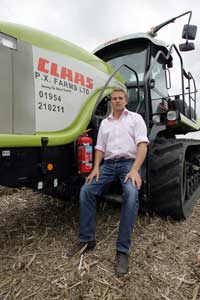Should all farmers retire at 60? Yes says James Peck

This year’s Oxford Farming Conference will debate the motion “This House believes that all farmers should retire at 60”. James Peck explains why he is in favour of the motion.
According to the Oxford English Dictionary, the origin of the word retire is from the French retirer – to draw back. Therefore, I would rather propose the motion that farmers should “draw back” at 60 and so I’ve taken the liberty of putting inverted commas round “retire”.
The target of our efforts should probably not be the age when farmers retire (since people are living longer anyway and the retirement age is rumoured to rise), but how they can be encouraged to welcome the younger generation into the industry and work together with them moving forward.
Ideally we need to make sure that family farming businesses continue to grow by retaining the knowledge and skills from the past, while nurturing new and enthusiastic talent which can look towards the future and maximise long term growth and income.
If this transition cannot be successfully achieved, the risk is of the farm becoming stagnant or failing. This can be down to the loss of historical skills and knowledge from the older generation and/or the lack of young people willing to wait their turn to join the industry when there are so many opportunities now available both here in the UK and abroad.
We all know of stories of young farmers in their 30s leaving the family farm because the grandfather in his 80s still holds the purse strings.
My father is now only one year away from the golden age of 60, and yet every time I ask him if he is ready to stand down his answer is “no”.
This would mean that the estate would be handed over to me only on the event of my father’s death, which hopefully is a good few years away.
Estimating that this could be 30 years in the future, this would mean I would only take over control after I am 63. So I would have to hand it over to the next generation, missing me out completely or worse keep it until they are 60 plus.
Young farmers should be regarded as an asset for any prudent older farmer to capitalise on.
The prudent “retired” farmer might, for example, consider contracting out but staying involved and then look to using his wisdom and experience not only at home, but for the good of others, by getting more involved in organisations such as NFU or CLA.
In our family we have addressed the handover in a different way to achieve maximum benefit for all. Father has retained security and control of the farm and its assets, while making more time available for advising industry related groups.
In 2003, I started my own business using the farm site as a base. I deal with the day-to-day farming of the land on a contract basis, and also provide this service for other local landowners.
I have also diversified into grain haulage and grain storage. The background support from my father, both by him allowing me to use the strength of the estate’s assets, and by providing advice and guidance when I request it, has helped me to achieve my goals.
It is probably fair to say that individuals who won’t stand aside for the next generation will never be convinced to do so regardless of the retirement age.
But what are the reasons? Is this caused by competitive instinct and the fear that the next generation will be more successful? Or the fear that instead of retiring to enjoy their later years they will simply go to seed?
James Peck is a former Farmers Weekly Young Farmer of the Year and runs his own farming company PX Farms which is based at Dry Drayton in Cambridgeshire
